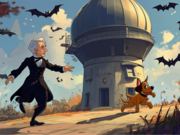多了去了
Characters and words in 多了去了
many; much / too many; in excess / (after a numeral) ... odd / how (to what extent) (Taiwan pr. [duo2]) / (bound form) multi-; poly-
多
=
夕
:
Mnemonic symbol: Immanuel "Many" Kant.
Many (多) and Doggy Dog (du) have great fun chasing a bat (夕) in front of the observatory (o1). After a while there are two bats (多), and it's not so easy to chase them any more. Suddenly there are more and more (多) bats! Now Many and Doggy Dog experience what it is like to be chased for a change.
Many (多) and Doggy Dog (du) have great fun chasing a bat (夕) in front of the observatory (o1). After a while there are two bats (多), and it's not so easy to chase them any more. Suddenly there are more and more (多) bats! Now Many and Doggy Dog experience what it is like to be chased for a change.
(completed action marker) / (modal particle indicating change of state, situation now) / (modal particle intensifying preceding clause)
to finish / to achieve / variant of 瞭|了[liao3] / to understand clearly
了
=
乛
+
亅
:
Mnemonic symbol from "to finish" and the shape of the character: a prize cup.
Li Qingzhao (li) is responsible for manufacturing a prize cup (了). She only needs to add a poetic engraving. Unfortunately, she suffers from a writer's block. In the aorta's living room (ao3), someone left a cryptic message engraved on the walls using a sickle (乛), which is still lying on the floor. Being an accomplished poet Li Qingzhao is able to understand the message clearly (了), realizes its poetic potential and starts to engrave it on the prize cup using a crowbar (亅).
Li Qingzhao (li) is responsible for manufacturing a prize cup (了). She only needs to add a poetic engraving. Unfortunately, she suffers from a writer's block. In the aorta's living room (ao3), someone left a cryptic message engraved on the walls using a sickle (乛), which is still lying on the floor. Being an accomplished poet Li Qingzhao is able to understand the message clearly (了), realizes its poetic potential and starts to engrave it on the prize cup using a crowbar (亅).
to go / to go to (a place) / (of a time etc) last / just passed / to send / to remove / to get rid of / to reduce / to be apart from in space or time / to die (euphemism) / to play (a part) / (when used either before or after a verb) to go in order to do sth / (after a verb of motion indicates movement away from the speaker) / (used after certain verbs to indicate detachment or separation)
去
=
厶
+
土
:
Mnemonic symbol: The "nose" part (厶) can be seen as an arm, which goes through "earth" (土), and this reminds me of some protesters who lock themselves (or their arms, to be specific) to concrete barrels. Cupids dirt capsule could also be a concrete barrel. So in other characters, I'm going to represent 去 by a concrete barrel.
Cupid (qu) is trying to send himself to earth. In the bathroom of the space station (Ø4), he has prepared a capsule made of dirt (土). He's wearing his lucky fake nose (厶) when entering the capsule.
Cupid (qu) is trying to send himself to earth. In the bathroom of the space station (Ø4), he has prepared a capsule made of dirt (土). He's wearing his lucky fake nose (厶) when entering the capsule.
Words with 多了去了
多了去了
is not used as a component in another word.
Sentences with 多了去了
多了去了 currently does not appear in any sentence.



